One night, Abigail Boone went to bed as her usual energetic self—a mother, a wife, a violinist, and an avid runner. By morning, her world would be turned upside down. What began as an achy leg escalated into a terrifying experience that left her barely able to move.
“I went from being healthy to not being able to get up and go to the bathroom,” she recalled.
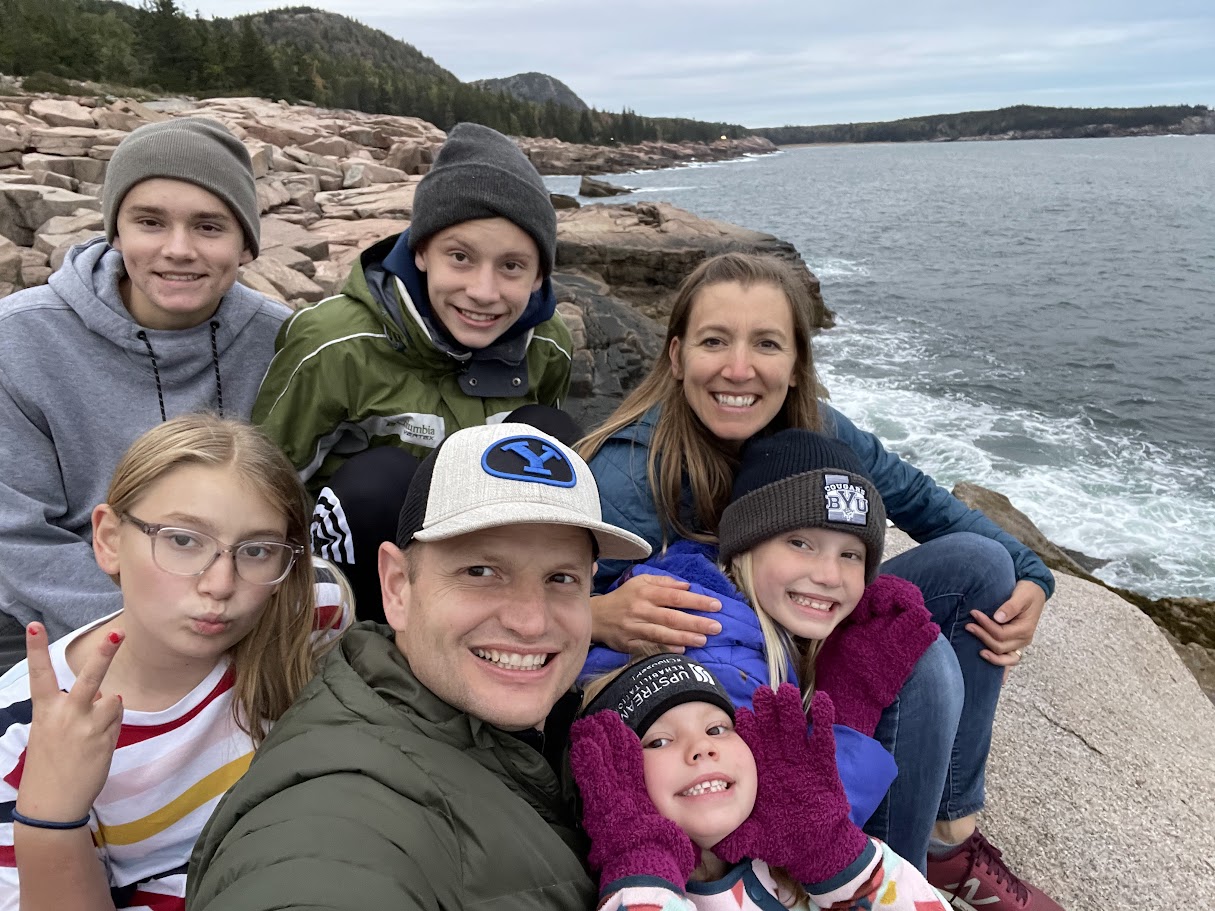 Abigail Boone, her husband, and their childrenToday, Boone has regained control of her life thanks to support from the UAB Department of Psychiatry and Behavioral Neurobiology—enough so that she is training to participate in a 140.6-mile Chattanooga Ironman Triathlon in September. But the road to this point was not without its challenges.
Abigail Boone, her husband, and their childrenToday, Boone has regained control of her life thanks to support from the UAB Department of Psychiatry and Behavioral Neurobiology—enough so that she is training to participate in a 140.6-mile Chattanooga Ironman Triathlon in September. But the road to this point was not without its challenges.
When everything changed
That evening, when everything changed, Boone went to bed as usual. Her left leg had been achy, but there were no other warning signs. Then, suddenly, she experienced an overwhelming sensation, like a charley horse spreading throughout her entire body. This marked the beginning of a 30-minute psychogenic nonepileptic seizure.
"I was terrified," Boone said.
Her movements became sporadic, like violent muscle spasms. She experienced symptoms such as physical paralysis and cognitive impairment.
"I couldn’t breathe. I couldn’t see. I couldn’t talk," she remembered. "I felt like I was dying."
The dramatic shift in her body's functioning left Boone in shock.
"Initially, I couldn’t really think," she admitted. "Then I remember telling myself, ‘Don’t pass out. Stay conscious.’”
Thankfully, she was not home alone. Her husband and son sprang into action, frantically researching what could be happening, working to keep her calm, and trying to understand the situation to determine how to assist her.
At first, they suspected it may be a stroke. But her husband, a physical therapist, ruled out that likelihood. Boone and her husband
Boone and her husband
Though they didn’t know it at the time, they were witnessing the onset of Functional Neurological Disorder (FND). FND is a medical condition in which there is a problem with the functioning of the nervous system and how the brain and body send and receive signals. Neurological symptoms may include weakness, numbness, paralysis, tremors, or functional seizures without any medical or neurological explanation.
“Functional Neurological Disorder is a brain network disorder that disrupts communication between the brain and body, resulting in neurological symptoms,” explained Aaron Fobian, Ph.D., clinical psychologist and professor in the UAB Department of Psychiatry and Behavioral Neurobiology. “These symptoms are often highly disabling, with profound physical, social, financial, and emotional impacts on individuals with FND and their families.”
The search for answers
After the first episode, Boone believed the worst was over. She tried to go back to sleep, thinking the experience was just a one-time occurrence
"I did feel better," she recalled. "I tried going back to sleep but woke up to another 30-minute functional seizure."
Concerned for answers, she contacted her primary doctor that same day. Her doctor wanted to rule out a few things, like multiple sclerosis (MS), and recommended an MRI. As it was the weekend, she waited until she could receive further testing. But by Monday, the episodes had worsened.
"They were more intense and lasted longer. They wouldn’t stop," she said.
Fearing for her health, Boone and her husband rushed to the emergency room, where she was admitted for further testing, including spinal and brain MRI, EEG, EKG, and bloodwork. Within two days, she finally received a confirmed diagnosis: FND.
“I was terrified to learn that there was no medication to treat my condition,” she stated. “I was also told I would likely have FND for the rest of my life.”
Although she was grateful for a skilled medical neurologist, she quickly realized that East Tennessee lacked the resources to support someone diagnosed with FND. It was suggested that she seek care at a specialized clinic, with the UAB Department of Psychiatry and Behavioral Neurobiology being the neurologist's first recommendation.
Hope restored
With UAB, Boone found hope. She realized that her recovery wouldn’t come from a prescription; it would come from her own determination. Physical therapy, cognitive behavioral therapy, and UAB Retraining and Control Therapy (ReACT) would be the foundation of her healing.
“It was liberating to know my health was in my hands. I was willing to do whatever it took to get better,” she explained.
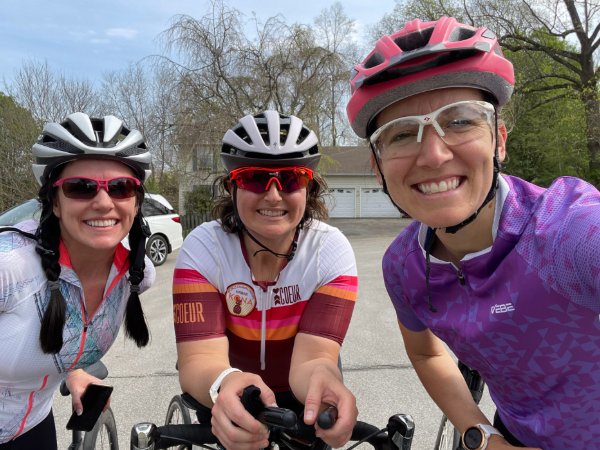 Boone biking with friendsYet, fear lingered. As a violinist, she worried—what if she never regained use of her left hand? And as an athlete training for an Ironman triathlon, she questioned—would she ever run again? She held on to what the neurologist from the ER in Tennessee had said to her:
Boone biking with friendsYet, fear lingered. As a violinist, she worried—what if she never regained use of her left hand? And as an athlete training for an Ironman triathlon, she questioned—would she ever run again? She held on to what the neurologist from the ER in Tennessee had said to her:
“You need to get back to training.”
While some doctors urged her to rest, this neurologist and the team at UAB insisted that pushing her limits was the key to recovery. Boone was stunned and relieved. Running wasn’t just exercise for her—it was a vital part of her spiritual growth and a cornerstone of her mental and emotional health. Pursuing endurance goals had always brought her immense joy. At 15, she and her father had trained for a marathon together. The summer previous, he had spent months in a wheelchair battling a debilitating back injury.
“Although our first run was probably only a block or two, we gradually built up our stamina, ultimately running all 26.2 miles without stopping,” she shared. “That experience ignited my passion for endurance racing and inspired my dream of completing an Ironman someday, and also taught me the value of developing family relationships through training.”
Reclaiming her life
On many nights, Boone would wake up shaking—completely overwhelmed. She questioned her purpose, but starting therapy at UAB sparked a drive to keep going.
"I believe UAB is the only reason I am where I am,” she said. “I was totally not functional.”
Beginning her ReAct therapy program with Fobian was a turning point, helping to retrain both her brain and body.
The core principles of ReACT include:
- Challenging automatic thoughts – "I am not going to die. I decide what my body does."
- Retraining the involuntary symptoms using opposing responses – When her body shook, she learned to stretch and keep moving
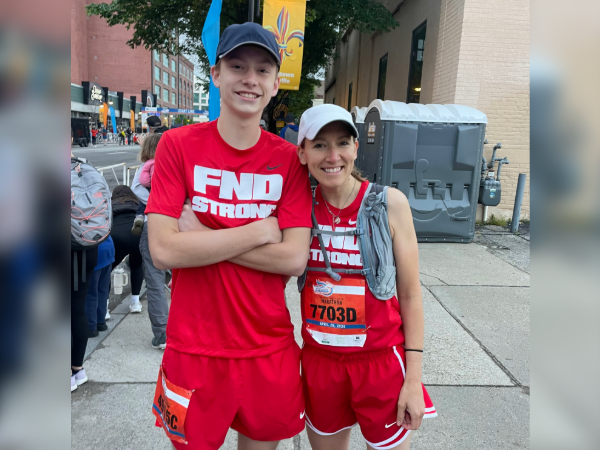 Boone and her son at the Kentucky Derby Marathon"Any time I felt insecure or didn’t want to push myself that day, they would ask me what I wanted to do—reminding me that FND will not stop me from reaching my goals,” she said.
Boone and her son at the Kentucky Derby Marathon"Any time I felt insecure or didn’t want to push myself that day, they would ask me what I wanted to do—reminding me that FND will not stop me from reaching my goals,” she said.
As part of that mindset, Boone recently achieved a powerful milestone with her son: the Kentucky Derby Marathon.
"It was his first marathon,” she shared. “Crossing the finish line with my son was an emotional experience. It was his first marathon of his life, and my first marathon since my onset of FND symptoms. It was a huge step toward my next goal of completing the Chattanooga Ironman."
Overcoming setbacks
After hosting a holiday gathering with her family, she experienced a setback, relapsing into some previous symptoms. At her next doctor's appointment, she questioned if she had done anything wrong. Should she not have hosted the family get-together?
Fobian and her team reassured her that the gathering was exactly what she needed.
"You are putting yourself in a position where you will experience stress, but it's good stress,” she recalls hearing. “They said, you are showing your body that you are in control."
They explained that FND treatment differs from traditional physical therapy, which emphasizes rest and caution to make sure you don’t exacerbate an injury by returning to activities too fast. With FND, pushing past discomfort is essential for progress. Since there is no physical injury associated with FND, it is safe to challenge yourself.
"They reminded me to push the boundaries—to do what’s uncomfortable but meaningful—so that I could adapt and grow,” she elaborated.
Overcoming negative thoughts
One of the greatest challenges Boone faced during her recovery was the battle against negative thoughts. She explained, "It was strange because, with other disorders, you can typically see proof—proof of what’s happening, proof of recovery. FND is a lot more complex."
She struggled with thoughts like, “It’s my fault. It’s not real. I’m just making it up. I can’t handle this.”
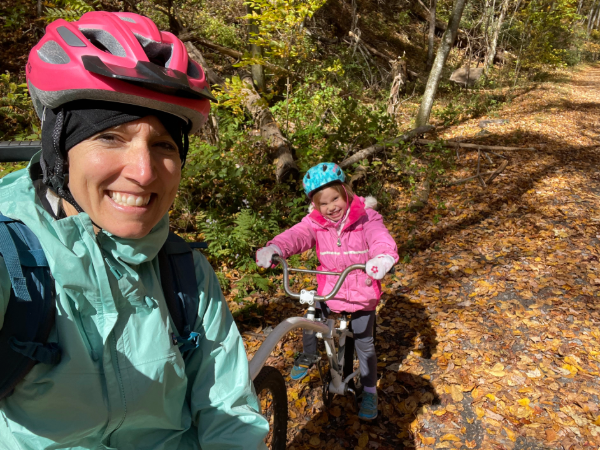 Boone and her daughter bikingReaching a place of acceptance was difficult. Then, an experience soon after her diagnosis helped her take control.
Boone and her daughter bikingReaching a place of acceptance was difficult. Then, an experience soon after her diagnosis helped her take control.
One night at 3 a.m., she attempted an opposing response by getting up and walking around. She went outside and saw moldy pumpkins swarming with fruit flies in the yard. At that moment, she found a tangible way to release her negative thoughts.
"I went inside, grabbed a Sharpie, and wrote my negative thoughts on each of my rotting pumpkins,” she explained. “One by one, I took those pumpkins and threw them in the garbage can. I told myself, ‘They are gone. I am not operating with those thoughts any longer."
Later that morning, she shared her experience with her 7-year-old daughter. They stood together and watched as the garbage truck collected the trash, including the moldy, written-on pumpkins.
"We started cheering and celebrating," she recalled. "We were disposing of and moving forward from those negative thoughts."
Encouragement for others facing FND
Boone expressed deep gratitude for the people who guided her ongoing recovery journey, saying, "Dr. Fobian and Ph.D. student Daniel Correa have been my guardian angels. I could not imagine what my life would have been like without them."
Her experience also allowed her to help others. When a running buddy’s teenage daughter was hospitalized with an FND diagnosis, Boone was there to offer support.
"I was able to sit down with her and let her know that I knew what she was going through. I told her, 'You are going to be okay. You will be able to run again. You will be able to do whatever you want—you are the one to decide what you want in the future.'"
Boone extends words of encouragement to others battling FND.
"It’s going to take time,” she explained. “It’s going to take work and support from other people, but with that help and your hard work, you will come out even stronger than you were before."
And she reminds them to find joy in the process.
"It’s okay to laugh along the way. I had to relearn everything—how to walk up the stairs, empty the dishwasher, and hit a volleyball. I made many silly mistakes, and I would just laugh."
Supporting UAB’s efforts to combat FND
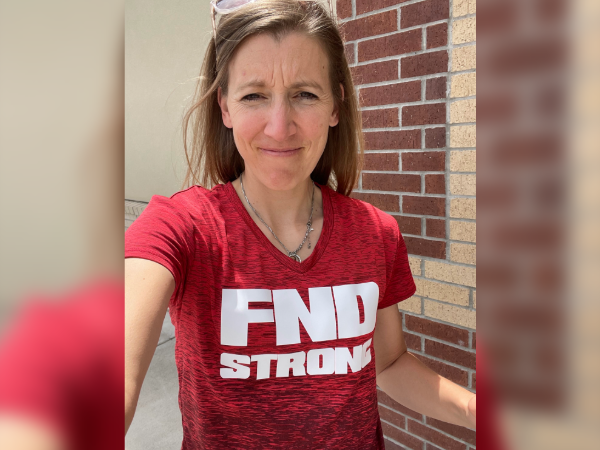 Motivated by her journey, Boone is now preparing for the Chattanooga Ironman Triathlon in September. She is participating in the “Your Journey, Your Cause” fundraising program through the Ironman Foundation. Without hesitation, she chose the UAB Department of Psychiatry and Behavioral Neurobiology as her fundraising recipient. She was driven by a deep desire to support research that could bring hope and answers to others battling FND.
Motivated by her journey, Boone is now preparing for the Chattanooga Ironman Triathlon in September. She is participating in the “Your Journey, Your Cause” fundraising program through the Ironman Foundation. Without hesitation, she chose the UAB Department of Psychiatry and Behavioral Neurobiology as her fundraising recipient. She was driven by a deep desire to support research that could bring hope and answers to others battling FND.
"It breaks my heart to think about people like me facing the same disorder and symptoms and not getting the help they need or knowing the best course of action to take,” she said.
She recognized the uniqueness of UAB’s approach to health care and its broader impact.
"They are training certified health professionals who can take their knowledge back to their communities and even abroad, helping to inform the medical world about FND,” she said. “It’s such a new phenomenon. The research Dr. Fobian is doing has the potential to have a huge impact on the world. This is why I am so passionate about supporting this work."
Boone’s journey is a testament to the power of perseverance and the impact of compassionate, research-driven care. The life-changing work at UAB, through innovative research and patient-centered treatment, empowers individuals like Boone to regain control of their lives while advancing the understanding and treatment of FND.
Learn more and to donate to support Boone’s journey at fndstrong.com.